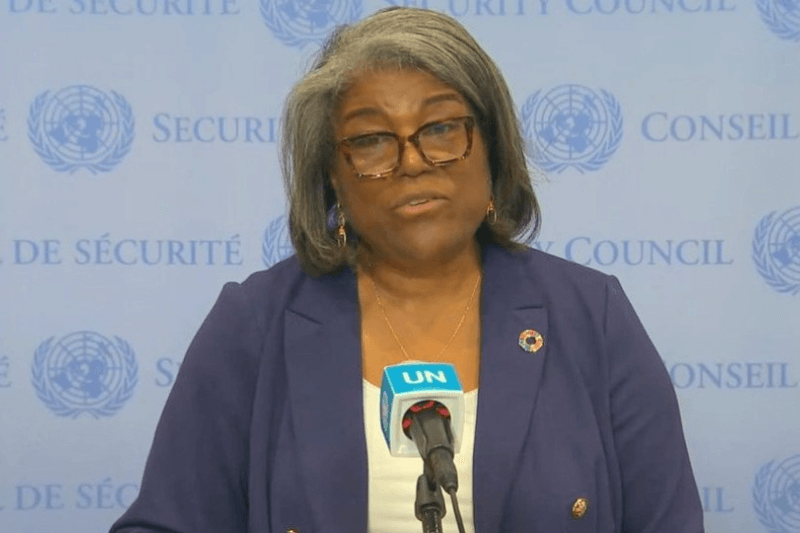On Thursday, U.N. ambassador Linda Thomas-Greenfield declared that the United States is funding $203 million to help stop the deepening humanitarian situation in Sudan from spiraling out of control. This large promise is in reaction to the terrible situation Sudan finds, where continuous violence has uprooted millions of people and caused great suffering.
According to UN estimates, around 9 million people have been compelled to evacuate their homes; over 1 million of them left the nation totally. Though not as much media attention as other world crises in Gaza and Ukraine, the fighting has claimed thousands of lives.
“We hope this fresh round of relief calls to action for others to follow. Thomas-Greenfield told reporters in New York that partners will use this money to create new shelters for refugees or offer monetary aid so they may pay rent and support youngsters whose life have been turned upside down by conflict return to school. The help is meant to provide the most vulnerable groups impacted by the conflict instant respite and support.
Beginning almost a year ago, the turmoil in Sudan drove tens of thousands of people into neighboring Chad in quest of safety. Widespread accounts of famine and starvation indicate that the situation is still worsening. “Three quarters of a million people, women and children, the very old and very young, facing hunger, starvation, IPC five level circumstances. Emphasizing the degree of the humanitarian catastrophe, Thomas-Greenfield said people are eating dirt to survive and depend on tree leaves for nutrition.
The United Nations has only gotten $155 million, or 6% of the $2.7 billion it asked for to meet Sudan’s humanitarian needs. Millions without enough food, shelter, or medical treatment have been left by this gap severely hindering relief operations.
“My call is for those influencing the warring parties to press them, to urge them to come to the table as unless they come to the table, the people of Sudan will continue to suffer. Thomas-Greenfield advised that there is no military answer for this dilemma. She underlined how crucial diplomatic initiatives are for bringing about peace and lessening of suffering for the Sudanese people.
neighbouring nations have also suffered greatly as a result of Sudan’s conflict. The flood of displaced people into Chad has taxed local resources and presented extra difficulties for humanitarian organizations working there. By giving much-needed financial support to help groups on the ground, the U.S. commitment seeks to alleviate some of these issues.
Apart from the U.S. commitment, several other nations and international agencies have declared their backing for Sudan. The United Kingdom has promised £50 million; the European Union has promised €85 million in humanitarian relief. Though notable, these donations still fall short of the $2.7 billion required to handle the whole extent of the situation.
Among the main groups helping Sudanese people through their crisis is the International Rescue Committee (IRC). The IRC underlined in a recent comment the need of a coordinated worldwide reaction to meet the rising humanitarian demands. Said IRC President David Miliband, “the situation in Sudan is dire and the international community must come together to provide the necessary resources and support to save lives.”
The continuous strife in Sudan has also attracted focus on the part regional countries play in the problem. Significantly influential nations like Egypt and Ethiopia have been asked to utilize their diplomatic clout to assist in the mediation of a truce and support of peace talks.
Additionally actively participating in attempts to arbitrate the situation is the African Union. AU officials pressed all sides in a recent conference to agree to a peaceful settlement and give Sudanese people top priority. “The African Union stands ready to support all efforts aiming at achieving a sustainable peace in Sudan,” stated AU Chairperson Moussa Faki Mahamat.
Keep Reading
Notwithstanding these initiatives, the ground situation still is unstable. Human rights reports of attacks on civilians and the employment of underage troops as well as other violations have kept coming in. Humanitarian groups have demanded more access to impacted regions in order to deliver necessary goods and safeguard weaker groups.
The gravity of the matter cannot be emphasized as the world community keeps struggling with the catastrophe in Sudan. Although the U.S. promise of $203 million is a noteworthy step, much more is required to meet the great humanitarian needs. With this dedication, hopefully other countries will be inspired to help and cooperate to eliminate suffering in Sudan.
Sudanese people are in great need of help; so, it is the responsibility of the world community to act and supply the required tools to save lives and give hope again.

